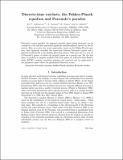Por favor, use este identificador para citar o enlazar a este item:
http://hdl.handle.net/10261/7523COMPARTIR / EXPORTAR:
 SHARE SHARE
 CORE
BASE CORE
BASE
|
|
| Visualizar otros formatos: MARC | Dublin Core | RDF | ORE | MODS | METS | DIDL | DATACITE | |

| Título: | Discrete-time ratchets, the Fokker-Planck equation and Parrondo's Paradox |
Autor: | Amengual, Pau; Allison, Andrew; Toral, Raúl CSIC ORCID ; Abbott, Derek | Palabras clave: | Parrondo's Paradox Fokker-Planck Equation Brownian ratchet |
Fecha de publicación: | 8-ago-2004 | Editor: | Royal Society (Great Britain) | Citación: | Proceedings of the Royal Society of London A 460(2048): 2269-2284 (2004) | Resumen: | Parrondo’s games manifest the apparent paradox where losing strategies can be combined to win and have generated significant multidisciplinary interest in the literature. Here we review two recent approaches, based on the Fokker–Planck equation, that rigorously establish the connection between Parrondo’s games and a physical model known as the flashing Brownian ratchet. This gives rise to a new set of Parrondo’s games, of which the original games are a special case. For the first time, we perform a complete analysis of the new games via a discrete-time Markov chain analysis, producing winning rate equations and an exploration of the parameter space where the paradoxical behaviour occurs. | Descripción: | 16 pages (final publisher version), 17 pages, 5 figures (attached post-print version).-- Published online 5 May 2004.-- ArXiv pre-print available at: http://arxiv.org/abs/cond-mat/0308609 | Versión del editor: | http://dx.doi.org/10.1098/rspa.2004.1283 | URI: | http://hdl.handle.net/10261/7523 | DOI: | 10.1098/rspa.2004.1283 | ISSN: | 1364-5021 |
| Aparece en las colecciones: | (IFISC) Artículos |
Ficheros en este ítem:
| Fichero | Descripción | Tamaño | Formato | |
|---|---|---|---|---|
| paper.pdf | 360,48 kB | Adobe PDF |  Visualizar/Abrir |
CORE Recommender
SCOPUSTM
Citations
33
checked on 20-abr-2024
WEB OF SCIENCETM
Citations
29
checked on 26-feb-2024
Page view(s)
396
checked on 24-abr-2024
Download(s)
416
checked on 24-abr-2024
Google ScholarTM
Check
Altmetric
Altmetric
NOTA: Los ítems de Digital.CSIC están protegidos por copyright, con todos los derechos reservados, a menos que se indique lo contrario.
